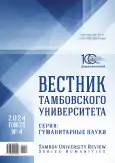The impact of religious diversity on the Kurdish identity within a geopolitical framework
- Authors: Baravi M.V.1, Tarasova D.A.1
-
Affiliations:
- National Research Lobachevsky State University of Nizhny Novgorod
- Issue: Vol 29, No 4 (2024)
- Pages: 1146-1156
- Section: FOREIGN COUNTRIES’ HISTORY
- URL: https://bakhtiniada.ru/1810-0201/article/view/297805
- DOI: https://doi.org/10.20310/1810-0201-2024-29-4-1146-1156
- ID: 297805
Cite item
Full Text
Abstract
Importance. The Kurds are currently dispersed across four countries (Turkey, Syria, Iran, and Iraq), which are quite negative towards them, trying to suppress expression of their identity. Historiographically, the Kurdish issue is usually perceived as another obstacle to regional stability in the Middle East, but the uniqueness of their position forces us to look at the situation from a different perspective. The aim of the study is to prove that the experience of asymmetric interaction of Kurds with various social actors can be extrapolated to address the problem of long-term stability in the Middle East and the resolution of other conflicts.Materials and Methods. The research is based on the principles of historicism and objectivity; chronological and structural methods and comparative analysis are used.Results and Discussion. The novelty of the study is that it allows us to consider the religious heterogeneity of the Kurds as a possible positive factor that can be used to build a new Kurdish identity. The peculiarities of the situation of the Kurds in different territories, including in a religious context, are also analyzed. The trends in ethnic relations in the territories of four nearby countries (Syria, Iraq, Iran, and Turkey) are determined.Conclusion. The eclectic nature of Kurdistan’s religious composition has greatly influenced Kurdish political identity, and despite external divisive factors, the diverse Kurdish population is united due to its culture of tolerance, which stems from its long history of diverse religious traditions. At the same time, it complicates their interactions with the neighbouring states that are intolerant of dissent and other faiths.
About the authors
M. V. Baravi
National Research Lobachevsky State University of Nizhny Novgorod
Email: melinabaravi@gmail.com
ORCID iD: 0009-0004-6063-6948
Research Scholar at History and Politics Department
Russian Federation, 23 Gagarina Ave., Nizhny Novgorod, 603022, Russian FederationD. A. Tarasova
National Research Lobachevsky State University of Nizhny Novgorod
Author for correspondence.
Email: daria.tarasova@corp.mail.ru
ORCID iD: 0000-0003-4825-6446
Research Scholar at History and Politics Department
Russian Federation, 23 Gagarina Ave., Nizhny Novgorod, 603022, Russian FederationReferences
- Ofra Bengio. (2018). Kurdistan’s Moment in the Middle East. Moshe Dayan Center, 468 p.
- Vertyaev K.V., Ivanov S.M., Makarenko V.V. (2023). Rozhava: fenomen kurdskoi avtonomii v Sirii. Moscow, Institute of Oriental Studies of the Russian Academy of Sciences Publ., 368 p. (In Russ.) https://elibrary.ru/cwhujs
- Baravi M.V., Kretov A.D., Tarasova D.A. (2024). Ethnic Kurdistan in the context of 21st century geopolitics. Konfliktologiya/Nota bene = Conflict Studies, no. 1, pp. 1-11. (In Russ.) https://doi.org/10.7256/2454-0617.2024.1.69609, https://elibrary.ru/qdutgw
- Khanaliev N.U. (2020). Prioritety natsional’noi bezopasnosti Rossiiskoi Federatsii: ehvolyutsiya balansa sil v bor’be za Bol’shoi Blizhnii Vostok. Moscow, University Book Publ., 520 p. (In Russ.)
- Zhigalina O.I. (2006). Collection of Works: The Kurdish Question in Western Asia at the Beginning of the 21st Century. Moscow, Institut Blizhnego Vostoka Publ., 342 p. (In Russ.)
- Nader A., Hanauer L., Allen B., Scotten G. Ali. (2016). Regional Implications of an Independent Kurdistan. Santa Monica, RAND Publ., 159 p.
- Ocalan A. (1998). Kurdistanskaya deistvitel’nost’ s XIX veka po nastoyashchee vremya i dvizhenie RPK. Moscow, Axina Welat Publ., 378 p. (In Russ.)
- Dubinin A.I. (2023). The ethnic factor in international relations in the Middle East: a historical retrospective and the current state. Genesis: istoricheskie issledovaniya = Genesis: Historical Research, no. 6, p. 27-46. (In Russ.) https://doi.org/10.25136/2409-868X.2023.6.40988, https://elibrary.ru/cvqkzr
- Elitsoy A. (2017). The Kurdish Hizbullah and its shifting attitude towards Kurdishness and the Kurdish issue in Turkey. Fritillaria Kurdica. Bulletin of Kurdish Studies, no. 17, p. 4-19.
- Ofra Bengio. (2017). The Kurds in a Volatile Middle East Report. Mideast Security and Policy Studies.
- No. 130, Israel.
- Zhigalina O.I. (1996). Ethnosocial Evolution of Iranian Society. Moscow, Oriental Literature Publ., 264 p. (In Russ.)
- Omarkhali Kh.R. (2004). The ethnic identity of the Kurds and the self-identification of the Yazidi Kurds. Interaction with representatives of other cultures. Materialy 7 Molodezhnoi nauchnoi konferentsii po problemam filosofii, religii, kul’tury Vostoka «Put’ Vostoka. Kul’turnaya, ehtnicheskaya i religioznaya identichnost’» = Proceeding of the 7th Youth Scientific Conference on the Problems of Philosophy, Religion, Culture of the Orien: The Way of the East, St. Petersburg, no. 33, pp. 100-105. (In Russ.)
- Pobedonostseva Kaya A.O. (2021). “Yazidi texts” by O.L. Vilchevsky. Yazyki i kul’tury stran Azii i Afriki: tezisy dokladov Mezhdunarodnoi nauchno-prakticheskoi konferentsii = Abstracts of the Reports of the International Scientific and Practical Conference: Languages and Cultures of the Countries of Asia and Africa, Moscow, Moscow State Linguistic University Publ., pp. 163-165. (In Russ.) https://elibrary.ru/kjctwf
- Naumkin V.V. (2019). The Kurdish conundrum of the Middle East (the case of Iraq). Mirovaya ehkonomika i mezhdunarodnye otnosheniya = World Economy and International Relations, vol. 63, no. 5, pp. 76-87. (In Russ.) https://doi.org/10.20542/0131-2227-2019-63-5-76-87, https://elibrary.ru/pitcvz
- Zhigalina O.I. (2009). Sovremennoe sostoyanie kurdskogo voprosa v Turtsii. Vostok. Afro-aziatskie Obshchestva: Istoriia i Sovremennost, no. 5, pp. 151-153. (In Russ. https://elibrary.ru/ldeuvz
- Malovany P. (2017). Wars of Modern Babylon: a History of the Iraqi Army from 1921 to 2003. Kentucky, University Press of Kentucky, 928 p.
Supplementary files









